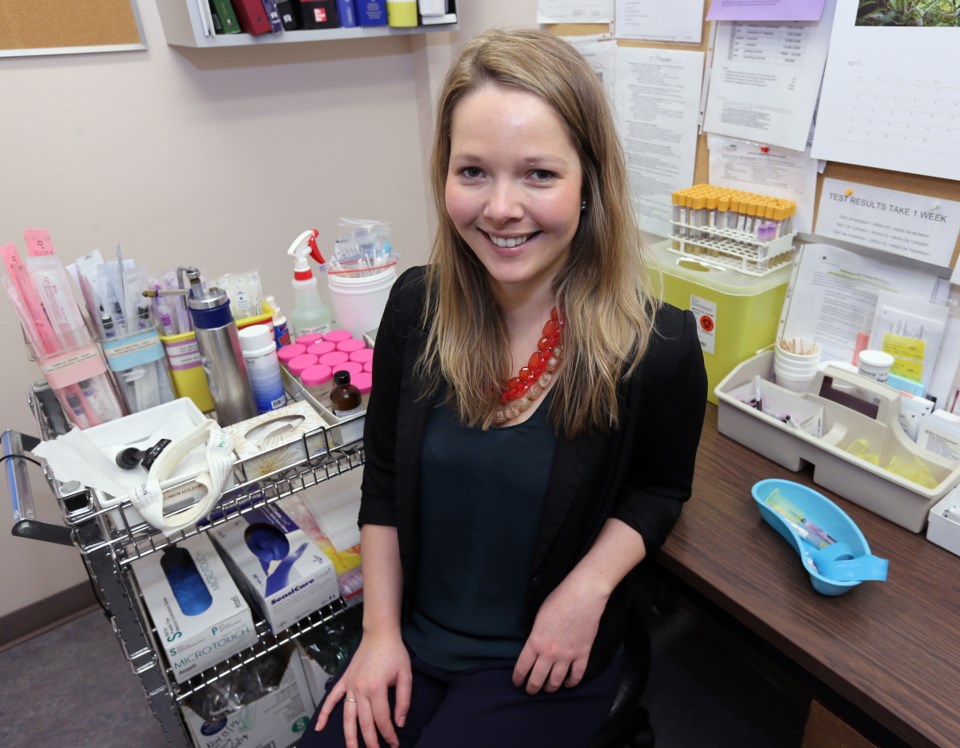B.C. is a global leader in the fight against HIV/AIDS, and the only Canadian province showing a consistent decline in new HIV diagnoses, says the B.C. Ministry of Health. New diagnoses dropped sharply from 850 in the mid-1990s to 238 in 2012.
The risk of spreading HIV increases when people do not know they’re infected — one of the reasons for the push by the ministry and the B.C. Centre for Excellence in HIV/AIDS for everyone age 18 to 70 to get HIV tests every five years.
Research cited by the B.C. Centre for Excellence in HIV/AIDS indicates that people who do not know their HIV status account for more than 50 per cent of new sexually transmitted infections.
“We’ve totally moved away from risk-based testing,” said Sophie Bannar-Martin, co-ordinator of STOP HIV/AIDS for Island Health. “Anybody can be impacted by HIV, even if we don’t identify with any particular risk.”
Until last year, HIV tests were primarily promoted for high-risk groups, such as people having unprotected sex or sharing injection-drug paraphernalia. The goal now is to identify the virus as something anyone could have come into contact with, she said.
Even adults older than 70 are advised to get one clear test on their files.
HIV tests rose by more than 5,000 among Vancouver Island residents between 2012 and 2014 to more than 35,000, Island Health figures show. Testing between 2012 and 2014 revealed 81 cases of HIV.
“We’re encouraged and excited to see the testing take-up,” Bannar-Martin said. The goal is to identify the virus early on in the infection, she said, because HIV is highly infectious when first contracted. Flu-like symptoms can be gone within a few weeks and can be so mild that people do not notice them.
People in risk groups are advised to test every six months, said Katrina Jensen, executive director of AIDS Vancouver Island, adding the significant increase in test numbers is great news. When people are aware of their HIV status, they’re more likely to protect themselves and others, said Jensen “We know that the earlier people test, the better the outcomes are in terms of their HIV,” she said.
HIV is a chronic disease and patients can have near-normal lifespans with proper treatment, Jensen said, but the key is to be diagnosed soon after infection.
Island Health is the only B.C. health authority to do HIV tests in-house, ensuring faster turn-around time. While others send their tests to the B.C. Centre for Disease Control, the Island’s are processed at Royal Jubilee Hospital. As a result of increased testing, the province is catching more cases of HIV, so there has been an uptick in identified cases of HIV from 238 in 2012. “This does not mean that they are newly acquired cases, but rather newly identified,” said Health Ministry spokeswoman Laura Heintz, citing a B.C. Centre for Disease Control analysis.
Anti-retroviral HIV treatment is provided at no individual cost to qualified B.C. residents.
The Public Health Agency of Canada says up to 25 per cent of Canadians with HIV may not know it, but that figure does not reflect provincial statistics, said Dr. Julio Montaner, director of the B.C. Centre for Excellence for HIV. Estimates are derived from studies that sample different groups and the findings are extrapolated to the community at large. “B.C. is on the low side of the estimate and Saskatchewan on the high end,” he said. “However, firm data to definitively support this is not available.”
Dr. Robert Hogg, director of the drug-treatment program at the Centre for Excellence for HIV, said there is wide variability when it comes to knowledge of one’s HIV status. Studies show that men over 30 in urban centres who have sex with men are almost always aware of their HIV status, he said.
Island Health’s goal is to do 45,000 HIV tests in 2016. So far, Islanders are getting tested at a rate of 4,648 per 100,000 population, less than half the nearly 12,000 per 100,000 in the Lower Mainland.
Island Health has received $4 million over the last three years from the Health Ministry’s $19.9 million annual budget for STOP HIV/AIDS.
Since last August, the Medicine Shoppe pharmacies in Victoria on Fort Street and in Nanaimo on Terminal Park Avenue have offered free, anonymous, five-minute HIV tests as part of a year-long pilot project. If someone tested positive, said Bannar-Martin, they would be sent to a participating walk-in clinic.
Five workshops have been offered for Island family doctors this year on how to talk to patients about HIV testing. Bannar-Martin said some MDs already offer HIV tests to patients, but others are unsure how to raise the issue.



